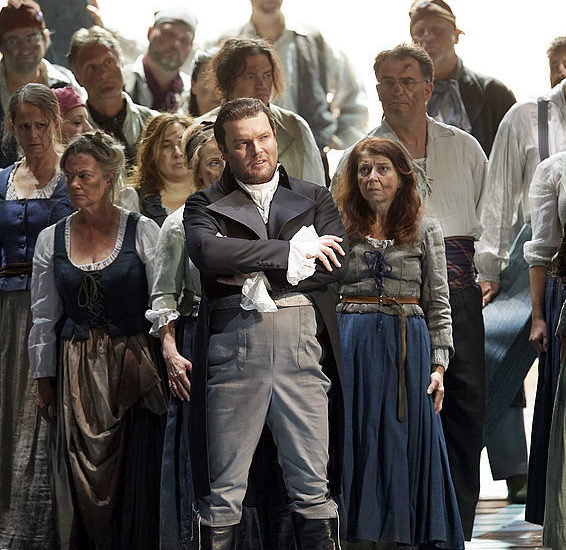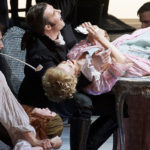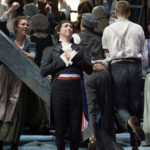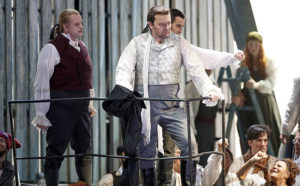 Why an opera about the French Revolution, Dantons Tod, premiered in post-war 1947 Salzburg? Gottfried von Einem’s opera is based on the play by George Büchner, about the gullibility of the people, how power corrupts, and “what it is in people that lies, murders, and steals.” (Thus it’s an epitaph to national socialism.)
Why an opera about the French Revolution, Dantons Tod, premiered in post-war 1947 Salzburg? Gottfried von Einem’s opera is based on the play by George Büchner, about the gullibility of the people, how power corrupts, and “what it is in people that lies, murders, and steals.” (Thus it’s an epitaph to national socialism.)
The ‘French Revolution’ was the mother of revolutions, at least in modern times. The opera deals with the phase around 1794. Danton and his friends were defeated by Robespierre’s party, submitted to a show trial and executed: the victims of a new Reign of Terror (La Grande Terreur.)
But this is no mere text-book history. Perhaps only opera can bring to life, on stage, the epic nature of events. Not just the colourful spectacle, the dangerous masses, but through music (von Einem’s) and text (Boris Blacher)- describe the human drama in the the power struggles between the main characters, Danton (Tomasz Konieczny), and Robespierre (Thomas Ebenstein.) More than speech, or soliloquies, the opera’s arias, and ensembles- especially emphasising the chorus- elevate the drama to a higher, sublime level.
The opera runs for barely 1 hour 45 minutes, without interval, but there’s as much going on as in 3 hours, 4 Acts. Von Einem’s music isn’t ‘serial’, but accessible, richly descriptive, using a fascinatingly varied instrumental palette, ‘diverse rhythms and forms’. (Vienna State Opera Orchestras and Chorus exemplary under Michael Boder.)
The stage set (Josef Köpplinger) is monumental, “a unit set like as cube”. More like a film set, and if you’re sitting in a side box, you only get a limited perspective.
 The opening scene is one of desolation, a war zone, with a still-burning raft. The action is on multiple levels: the beautiful lady dealing cards (Ildikó Raimondi); Danton, Konieczny, swashbuckling white shirt, breeches, black boots, lustfully pursuing his woman across the stage; and there’s a couple apparently copulating. (These are revolutionary times, also for sexual morality.)
The opening scene is one of desolation, a war zone, with a still-burning raft. The action is on multiple levels: the beautiful lady dealing cards (Ildikó Raimondi); Danton, Konieczny, swashbuckling white shirt, breeches, black boots, lustfully pursuing his woman across the stage; and there’s a couple apparently copulating. (These are revolutionary times, also for sexual morality.)
On the lower stage, Robespierre (Ebenstein), black-suit, ruffed white shirt, slicked hair, ‘ the lean and hungry look.’ Like Cassius in (Shakespeare’s) Julius Caesar, a power broker. The revolution is at the stage of reorganisation, he sings: the form of government is like a gown to fit the people. We want melodic songs, to sing the praises of our ideal society, our virtuous republic.
Danton is Robespierre’s opposite, physically and temperamentally. Konieczny, rugged, well-built, corpulent, is known as a bon vivant. His baritone earthy- the pragmatist, a little cynical – to Robespierre (Ebenstein’s refined tenor), rarefied, effete, the pure idealist. “Who’s going to make all these wonderful things happen? ” The road is a long one, so why, Danton asks, did he start the struggle? Danton’s is a realistic, if cynical view of the people: the Statue of Liberty is not yet cast, he sings.
As if to make the point, the next tableau, is a raucous crowd scene. A gross, fat man is bullying a mother (Lydia Rathkolb), her daughter presumed accused of prostitution. He knocks her to the ground; in the disorder, brutality prevails. An elegantly dressed gentleman pleads with the crowd; ‘there are no gentlemen here.’
Ebenstein arrives in his smart black suit. What’s happening, citizens? They heckle him; we don’t want any law. He retorts, You murder yourselves in your wrath. People do your duty!  Come over with me to the Jacobins, he tries to muster support.
Come over with me to the Jacobins, he tries to muster support.
Danton ridicules Robespierre for his affected virtue. Robespierre you are outrageously self-righteous! Are you heaven’s policeman? – Danton, do you deny both virtue and vice? How dare you disparage me in such a manner!
How much longer will he hesitate? Robespierre is goaded into following the extremist Saint-Just (Peter Kellner) who urges him to arrest Danton and his allies. Camille Desmoulins (Benjamin Bruns) has his hand on Robespierre’s shoulder, and strokes his hair. Robespierre, without his friends, is left desolate and alone.
We see Desmoulins, then Danton, decadently slouched on a chaise-longue. They comment on Saint-Just’s crude, lack of spirituality, like the painter David’s victims of the revolution. They joke that if Camille dies, (Bruns has long blonde hair), they’d cut off his hair and make wigs.
Lucile has so far kept silent. Olga Bezsmertna sings introspectively in a beautiful aria, as if powerless: they are evil, these times, how can we escape them? Daring, what do they know of daring; they can’t stop.
Act 2, Danton and his friends are imprisoned. The crowd are lined up front of stage; but they can’t rely on help from their supporters. (Official opinion is turning against them.) There’s an air of melancholy and resignation. The people question Danton’s luxurious lifestyle, his taste for expensive wines. ‘He was as you or I: how did he get rich? Down with Danton! some of them sing.
Konieczny plays Danton with a rough-edged bluntness, but now there’s a note of cynical despair. Konieczny’s magnificent bass/baritone registers every emotional shift. Dying is a miserable business, he sings, while Camille desperately ‘wants to steal a glance of life.’ Danton, in his aria, asks ‘when will the clocks stop.’ He would have liked to die like a star falling. Danton comforts the slumbering Camille, curled up under the table, between sleeping and waking.
We see the crowds peering through the wooden salts each side of the stage: key players in the revolutionary game. Other prisoners are crying out, they want to murder us. Who will free us? – Once heroes to the crowd, they’re now on the wrong side of the barricades.

An elegant table with Bourbon period chairs in the foreground. Behind a scaffold Danton addresses the revolutionary tribunal. At first, Danton, renowned for his rhetoric, is able to skilfully fend off his opponents. You know my name? My name is the Danton of history. And, he retorts, your State will answer to posterity for this slander. It was he who declared war on the monarchy. (Long live Danton!) The Jacobins are wearing claret-coloured velvet hats. Danton accuses Robespierre, Saint-Just, and the Committee of Public Safety, of high treason. They, however, accuse Danton’s and Camille’s wives of trying to bribe the Tribunal. And this Court, backed by military force, is meting out justice? Then, to the crowds, ‘ you are thirsty for the blood of the guillotine.’ The stage is bathed in blood-red light, matching the red carpet bordering the tribunal’s table. The crowd are working themselves into hysteria. The prisoners are hustled before the people, ( the dangerous masses Büchner referred to.) His head will buy us all bread; (Hérault) de Séchelles, your pretty hair will make nice wigs. It’s great that executions are being made so public!
Two executioners emerge from the guillotine, their faces blood-smeared. Their days’s work is done, singing ‘When I go home the moon shines so beautifully.’ It sounds like a Viennese lieder, “perhaps the most beautiful melody in the opera.” But enigmatic. Einem intended to show executioners- even in a concentration camp?- were capable of human affection. (Yet they were ‘henchmen of death’; a thin line between crime and humanity.)
As an epilogue, Desmoulin’s wife Lucile sings of the Grim Reaper. Bezsmertna comes in, as if losing her mind. In the old German song, ‘There is a reaper, his name is death…’ And proclaims fatefully, condemning herself to death, Long live the King!
Unforgettable, exhausting, as powerful an experience as you can imagine in opera, all over too quickly. Vienna’s appreciative audience- some who’d seen the revival in 2018, Von Einem’s 100th- had come back for more. The House was full, the ovations tumultuous. © P.R. 22.05.2019
Photos: Tomasz Konieczny (Georg Danton); Michael Laurenz (Hérault de Séchelles) Ildikó Raimondi (Lady); Thomas Ebenstein (Robespierre); Benjamin Bruns (Camille Desmoulins), Thomasz Konieczny (Danton), Michael Laurenz
© Wiener Staatsoper/ Michael Pöhn

Top site ,.. amazaing post ! Just keep the work on !
I have to to read more about this from you! And I am going to share this blog straight away.
Thanks!